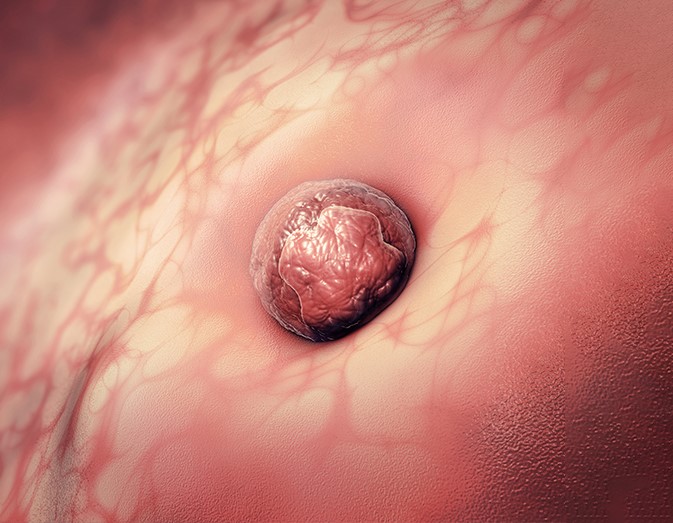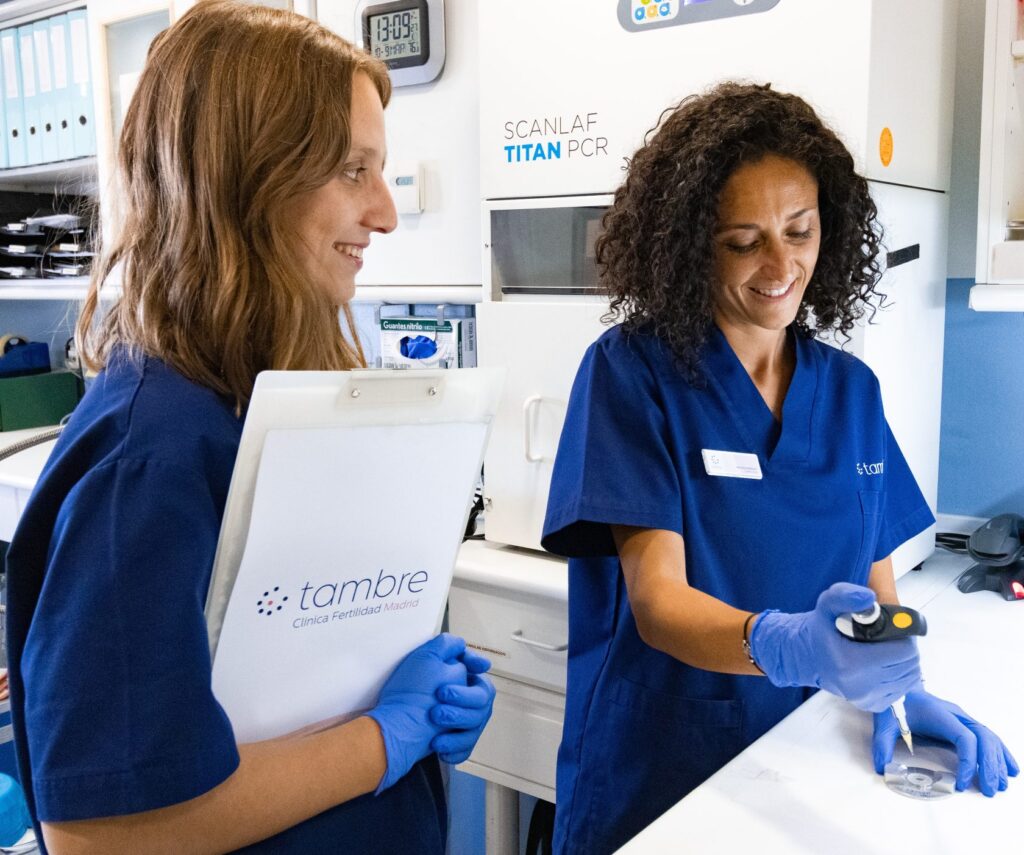blog tambre
Implantation Failures, Causes and Solutions

Table of contents
Embryo implantation failures and repeated miscarriage are situations that pose a challenge for women and couples who want to start a family as well as for fertility experts.
The reasons why an embryo does not implant in the mother’s uterus could be due to a variety of factors that might involve the woman, the man or the embryo itself. To find the causes of implantation failure and recurrent miscarriage, we, at Tambre carry out a thorough analysis, taking a multidisciplinary approach involving Doctors specialized in fertility, Embryologists, Geneticists and Immunologists. This allows us to search for what may be causing the implantation failure or recurrent miscarriage, and offer a precise diagnosis. This in turn will identify the most appropriate treatment for each patient.
What are implantation failures?
Implantation failure and repeated miscarriage are not the same, although in both cases a pregnancy does not occur.
An implantation failure occurs when a good quality embryo that has developed during the in vitro fertilization (IVF) process fails to implant and achieve a pregnancy on transfer to the patient. According to the recommendations of the Spanish Fertility Society (SEF), if after 3 transfers of good quality embryos, pregnancy is not achieved, then it is necessary to investigate the cause of these implantation failures.
The incidence is 10%, which is reduced to 5% when we rule out the uterine factor as a cause.
The term ‘recurrent miscarriage’ is used when the embryo manages to implant and has given rise to pregnancy, but the woman suffers a spontaneous loss before the 20th week of gestation. Recurrent miscarriage is when this occurs in two or more pregnancies, and in this situation, we suggest a series of tests to find the cause.
Causes of implantation failure
The causes that cause implantation failure are diverse:
- Problems in the uterine cavity
The endometrium must be in optimal condition for implantation to be successful. If the endometrium is too thin or thick, or if there are endometrial receptivity problems, implantation can be difficult. At Tambre, customization is one of our patient pledges. For patients who suffer from implantation failure without apparent cause, we have an endometrial receptivity test that provides us with valuable information to organize the transfer in a personalized way.
-
- ES-TIME Test: The ES-TIME test looks at whether the implantation window, the key moment to achieve implantation, is displaced, something that happens in around 30% of patients, and this allows us to carry out a personalized embryo transfer.
-
- ES-META Test: At the same time, we can ascertain whether there are pathogenic agents which are causing the embryo not to implant. This is possible by undertaking the ES-META test to identify potential microorganisms that are causing endometritis (mainly bacteria ) as well as to study endometrial microbiome (Microbiome Endometrial Typing Analysis).
- Immune factors
Some immune system disorders can cause the body to consider the embryo as an invader and reject it before implantation. At Tambre we have been pioneers in Spain in being the first assisted reproduction clinic to establish a Reproductive Immunology Unit to investigate and understand the causes of implantation failure, with the aim of offering different treatment options to patients.
The Unit investigates whether the causes of pregnancy not occurring, either due to implantation failure or the patient suffering recurrent miscarriage, have an immune origin. If this is the case a complete profile of the immunological factors involved in these situations is carried out.
- Hormonal imbalances
Hormonal fluctuations, such as low progesterone levels prior to the transfer, can affect the endometrium and therefore make implantation difficult.
- Genetic problems in the embryo
Despite being of good quality, some embryos may have chromosomal abnormalities that affect their viability and implantation capacity.
- Uterine abnormalities
Sometimes, alterations in the morphology of the uterus (unicornuate uterus, T-shaped uterus), presence of polyps or fibroids or adenomyosis (endometrial tissue that develops in the muscular wall of the uterus) can make embryo implantation difficult.
- Blood clotting problems
Thrombophilia’s may be involved in implantation failure and recurrent miscarriage. Clotting disorders such as antiphospholipid syndrome can increase the risk of blood clots in the uterus, making implantation difficult.
- Uterine infections
Infections or inflammation in the uterus can interfere with the embryo’s ability to implant properly.
The diagnosis, the first and most important thing
There are different causes that can explain why implantation failure occurs in IVF treatments with good quality embryos. That is why, to try to reduce implantation failure, as well as repeated miscarriage, the first thing we must do is carry out a complete investigation.
In order to offer a diagnosis at Tambre, we perform a thorough evaluation that may include tests such as hormonal analysis, genetic tests (to detect any possible chromosomal alteration within the embryo), and an anatomical study of the uterus and endometrium (through hysterosalpingography, hysteroscopy or magnetic resonance imaging).
Study of male factor (seminogram, karyotype study, etc.). At Tambre we go further with the study of sperm fragmentation (COMET) to see the DNA chain and assess whether it is necessary to improve semen quality, as well as whether it is necessary to use specific sperm selection techniques such as CHIP Fertile ( to exclude fragmented sperm, improve fertilization and to help embryos reach blastocyst).
In certain cases, we will also undertake a genetic test on the semen (FISH on sperm), where the chromosomes in the sperm are analysed. This could be related to assisted reproduction treatment failures, and offers information about genetic content.
Endocrinological study (diabetes, hypertension, hypercholesterolemia, thyroid problems, etc.) and immunological study (to detect, for example, if the mother’s body rejects the embryo). Immunological incompatibilities may be behind implantation failure and repeat miscarriage. One of the recommended techniques is the compatibility study between the uterine KIR receptors (killer immunoglobulin-like receptors) performed on the woman and the HLA-C molecules that the embryo will present. With a simple blood test carried out on the female patient and the partner or donor, you can find out if there is immunological incompatibility.
Experts in difficult cases
At Tambre we are experts in complex cases, we study any failures that have occurred in previous IVF transfers in other clinics. The purpose of this is to identify those actions which have been tried (and failed) in previous cycles and ensure we adopt a more effective treatment based on an accurate diagnosis.
How to reduce implantation failures
Once we have identified the cause of the implantation failure at Tambre, we will develop a treatment strategy which will allow us to address the problem in a personalized way and increase the chances of a successful implantation through:
- Embryo analysis
Through Preimplantation Genetic Diagnosis (PGD), embryos free of chromosomal and/or genetic alterations can be selected before transfer to the mother’s uterus, thus increasing the chances of successful implantation.
- Blastocyst transfers
In order to assess how an embryo is developing and thus be able to select the best ones with the greatest implantation capacity, it is advisable to carry out the transfer when they have reached the blastocyst stage, that is, around 5/6 days of development after fertilization.
- Delayed transfer
Another option that may be favourable is not to transfer fresh embryos but rather to freeze them to do so later in another cycle. In this way, we can carry out an endometrial preparation with pharmacological help or naturally, so that the endometrium is in an optimal condition and is more receptive than in the same cycle in which we have developed ovarian stimulation.
- Drugs
If we detect cholesterol, diabetes, or thyroid problems, as well as coagulation or immunological rejection, we have different drugs that will help avoid implantation failure.
- Surgery
When faced with certain diagnosis such as endometrial polyps or fibroids, we can perform a hysteroscopy to correct them. Similarly, if uterine abnormalities, such as a septate or bicornuate uterus, are identified, surgery could correct them and create a more conducive environment for implantation.
Do you need a personalised diagnosis?
If you have suffered implantation failure or repeated miscarriage and you want us to help identify a cause or provide a second opinion, let us help you. Our team is experienced in working with complex cases and will investigate, analyse and provide answers depending on your individual circumstances. You will be offered a bespoke treatment plan which will involve continuous monitoring.
In order that you feel completely supported throughout the process, you will have an advisor from the Tambre Specialized Guidance Unit who will accompany you and answer any questions you may have.
If you have any questions about implantation failure or want more information about the treatments we offer at Tambre, contact us and make your first appointment at 91 411 61 11. Implantation failure and repeated miscarriage do not mean your fertility journey is at an end. Give yourself a new opportunity to overcome these difficulties.



